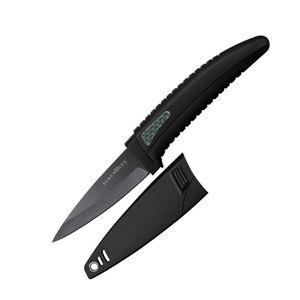Ceramic Knives are primarily made with zirconium dioxide, which is tough, durable yet relatively brittle in nature. Ceramic Knives are very much affordable as compared to knives made from different steel. These ceramic knives are best known for their edge retention, razor sharp edge, light weight and durability.
Ceramic knives vs Steel Knives
Ceramic knives are better than steel knives in two aspects.
1
Ceramic Knives do not rust, corrode or react with substances as they are inorganic. This enables the use of ceramic knives in highly corrosive environments without the concern of contamination.2
Most ceramic blades come with a very sharp edge from the factory. They can maintain the sharp edge longer than most knife steels even after repeated use.
Ceramic Knives
If you are looking buy a new ceramic knife set for your kitchen or want it as an EDC knife, you are in the right place. This article is solely about Ceramic Knives benefits, drawbacks, answer to queries related to ceramic knives helping you make informed decisions.
Pros of Ceramic Knives
Ceramic knives are super razor sharp knives when you have them out of box and they stay sharp for longer period of time as compared to any other steel knife. The secret behind their long lasting sharpness is Zirconium dioxide, which a really hard and comes after diamond in hardness ratings. So, if you want a knife which holds its edge for the longest time, Ceramic knife is the choice you must go with.
Being no metal involved in construction of Ceramic knives, they do not rust & they are chemically inert. This makes them easy to maintain and store. Ceramic knives don’t react with the atmosphere or most corrosive compounds. Making them a great EDC choice to use them in humid or even corrosive environments.
Knife weight is among the most important features when we are using a knife. A lighter knife means less stain on your fingers, hand and arm. Ceramic knives are always lighter as compared to other knifes whether Pocket Knives or Kitchen Knives. Being lighter in weight makes you easily handle the knife and you can work with if for longer time as well.
As mostly, we are used to have heavy knives, when you Ceramic Knife, you won’t feel you are holding anything and being super sharp you will not even feel the cutting action.
No one wants to transfer smell from one ingredient to the other while cutting fruits, vegetables or spices. Ceramic knives do not transfer odors when used to chop or cut different ingredients at the same time. This is because they have fewer pores than their metal counterparts. All you have to do is to rinse and dry the ceramic knife.
For example, if you cut garlic or onion and want to switch to fruits like apples, your ceramic will not transfer the garlic or onion odors to your fruits. All you are asked is to rinse and dry the knife.
As mentioned earlier, Ceramic Knives have fewer pores which makes them less absorb less of everything including dirt & grim. This makes them easy to clean and more hygienic to use as compared to their steel counterparts. Cleaning ceramic knives only require warm water and a quick scrub.
Cons of ceramic knives
Main problem of ceramic knives have is their brittle ness. Because they are super hard which keeps them sharper for longer yet they are very brittle. This implies that, they break in two or more or chip away easily if struck them again bones and frozen meat.
Since they cannot do the hard work, ceramic knives cannot be used alone in the kitchen but as accompaniments. That is why you hardly see, Ceramic Cleavers being manufactured. Reason they do not perform as the cleaver should.
Ceramic knives will hold a razor-sharp edge for the longest time, and you will enjoy using them until the day you want to sharpen them. Because they are very hard, sharpening them is not easy, and very few people know how to sharpen them.
Most manufacturers recommend that you take the knives to them for free sharpening.
All major ceramic knives manufacturers claim that their Ceramic knives are dishwasher safe. Yes, they can be but with experience, I must say, never use them in your dishwasher.
- Being brittle, a violet motion of water, or from any other cutlery item can easily break or chip it.
- As per experts hot water can compromise their edge as well.
Ceramic Knives in Kitchen
Benefits of Ceramic Kitchen Knives
Negatives of Ceramic Kitchen Knives
Do not use this type of knife for cutting through frozen food, as the blade may chip or break.
Ceramic Kitchen Knife Care and Maintenance
When using a ceramic knife, always cut straight up and down, as these knives cannot be twisted or flexed. Never use this type of knife to pry or to crush food items, as the knife is liable to break.
Ceramic Knives as Pocket Knives
Yes, these are good pocket knives if you have to open consignment bags, cutter wrappers, prep food in office or at work without worrying about sharpening then regularly. Yet, if it falls from your hand, you will end up breaking it.
Conclusion – Are Ceramic Knives good?
Just like coin has two sides, same goes with the above discussion about Ceramic knives and you now know that ceramic knives have both pros and cons.
Depending on your use scenario a ceramic knife is good as it does not experience corrosion or rust and can hold its sharp edge for an incredible period during use.
I don’t think however that you can do away with steel knives completely as the cons of ceramic knives like chipping and breaking and the need for special sharpening may leave you at a disadvantage.
Ceramic knife blades are not all-purpose hence you can only use them together with steel knives to improve your experience.
Do let us know in your comments




